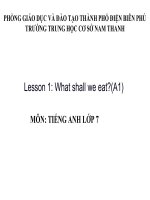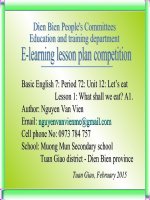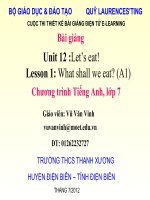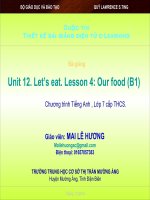Giáo án Tiếng Anh 7 unit 12: Let’s eat
Bạn đang xem bản rút gọn của tài liệu. Xem và tải ngay bản đầy đủ của tài liệu tại đây (141.21 KB, 24 trang )
Giáo án Tiếng anh 7.
Preparatory date:
Teaching date:
Period 73+ 74.
Unit twelve: Let’s
eat!
A/ What shall we eat? (A1+A2+A4)
I/ Objectives.
By the end of the lesson, the students will be able to tell about the food
throughout the dialogue.
II/ Language contents.
1, Vocabulary: chicken, beef, pork, pea, carrot, cucumber, spinach, papaya,
pineapple...
2, Structures: Let’s........
too/ so; either/ neither
III/ Teaching aids.
- Make a plan.
- Prepare a book, a tape, a cassette- player and a picture of the dialogue.
IV/ Teaching produces.
Stages
1, Warm up
Teacher’s activities
@Talk about the common cold.
Students activities
Go to board and talk about the
Hang the pictures of fruits and food on common cold.
the board and ask students answer the Look at the picture and speak
questions: How many fruits and food the names of fruits and food
have you known in English in the that you know.
picture?
2,
@ Now you continue looking at the
Presentation
picture and male a list of the fruits/ food Talk the names of fruits and
.
which you haven’t known their English food that you don’t know by
names in Vietnamese?
Vietnamese.
Explain the meaning of these words:
Read after the teacher these
Beef : thịt bò
Spinach: rau chân vịt
words and rewrite them into
Pork : thịt lợn
Cucumber: dưa chuột the notebooks.
Pea : đậu
Papaya: đu đủ
Carrot ; cà rốt
Pineapple dứa
Chicken : thịt gà
Durian: sầu riêng
Have them read these words.
Then play the tape and ask students to Listen to the tape and repeat
listen it carefully and answer the it.
question what they bought.
Teacher can give the words which the
students don’t know
Make again the dialogue with
Meat stall
a partner then practice in front
A selection of:
of the class.
Vegetable stall
On display:
What about....
Read these words.
Ripe :
Smell
Teacher can stop at each paragraph of
dialogue to explain the new words and Listen to the explaining of the
structures:
*Diễn tả sự đồng tình phủ định (cũng
không thế)
teacher.
- I don’t like pork
Rewrite these structures into
- Neither do I/ I don’t either.
your notebooks.
* Diễn tả sự đồng tình khẳng đình ( cũng
thế)
- I’d like some carrot, too.
Some
students
- I like cucumber.
sentences like that.
give
the
So do I/ I do, too.
* What about spinach and cucumber?
- I’d like them
@ Ask students to work with a partner Work with a partner.
3, Practice.
by making again the dialogue.
Listen and correct their mistakes
Answer
*Have students answer the questions:
questions.
the
teacher’s
-Who doesn’t like pork?
-What do they buy first?
Then work in small groups
-Who likes to buy papaya and pineapple? about this.
-What do they buy finally?
@ Ask students use the structures that
4,
they have just learnt to make sentences.
Make the dialogue with a
Production.
Form: A: I’d like chicken.
partner then practice in front
B: I do, too/ So do I.
of the class.
A: What about beef?
B: I don’t like it.
Others listen and give the
A: Neither do I/ I don’t either.
ideas.
Use the words that are in A4 to write
sentences.
Rewrite these duties into your
Call some students and ask them to notebooks.
write.
5Homework @ Learn by heart all the words and
structures.
Answer again the questions.
Do exercises into ex. book
V/ Draw experience.
Preparatory date:
Teaching date:
Period 75
Unit twelve: Let’s
eat!
A/ What shall we eat?(A3+ A5)
I/ Objectives.
By the end of the lesson, the students will be able to know how to prepare
the meals and use recipe to make some food.
II/ Language contents.
1, Vocabulary: cook, boil, heat, stir- fry, slice......
2, Structures: First, she sliced the beef.
Then, she sliced some green peppers and onions.
Next, she cooked some rice.
After that, she made cucumber salad.
III/ Teaching aids.
- Make a plan.
- Prepare a book, a tape, a cassette player and some pictures .
IV/ Teaching produces.
Stages
1, Warm up
Teacher’s activities
Students activities
@ Read and write all the names of
fruits and food that you know, then
Write the names of the fruits
answer the question: which fruits and
and food.
food do you like and dislike?
Answer the questions:
Do you always cook meals?
-Yes, I do.
Do you like this work?
-Yes, I do.
What do you do when you cook
Can speak by Vietnamese.
2
meals?
Presentation
@ Give some words to answer this Listen and read these words.
question: slice, boil, heat, stir- fry,
add
Read this text carefully
Now you look at the picture and
answer what they are doing?
After that, ask students to read Read and write these words.
carefully to answer the questions.
Go around the class to help the
students reading and finding the new
words :
- Green pepper: ớt xanh.
- Salt:
muối
- Vegetable oid: Dầu thực vật
- Soy sauce: xì dầu
Read loundly in front of the
- Cucumber salad: sa lát dưa chuột
class.
- Chopsticks: đũa
- Spoon: thìa
- Glass: cốc
Answer the teacher’s questions,
Call some students on and ask them to and then practice with a partner
read the text.
by
making
questions
and
Listen and correct the mistakes if they answering them.
3, Practice.
have.
- She cooked dinner.
@ Make questions for students:
-First, she slice the beef. Next,
-What did Hoa’s aunt cook?
she slice some green peppers
-What did she do first/ next?
and onions.
-How did she poil the spinach?
-She added a little salt to the
-What did she do last?
spinach so it tasted good.
-What did Hoa do?
-She sliced the cucumbers and
Have students make questions and made cucumber salad.
answer questions by working with a -Hoa set the table with places,
partner and then practicing in front of bowls, chopsticks, spoons and
the class.
glasses.
Listen and correct their mistakes.
Write the menu.
Now you look at part a : Answer the Compare with a partner and
question and answer: What did Hoa, then read your menu in front of
her uncle and aunt have for dinner? the class.
Write the menu.
Give the menu:- Cucumber salad with Look at these pictures and fill
onions.
- Boiled spinach.
the missing words, after that put
- Stir- fried beef with them in order to.
green peppers and onions.
- Rice.
Now you look at part b, and do the Listen and correct the mistakes
followings: This is the recipe Hoa’ if you have.
aunt used. You look at the passage
again and add the missing verbs to
complete the instruction and then Some students go to board and
match instructions to the pictures.
Ask students to compare with a
partner and then read loudly in front
of the class.
put the pictures in order to.
Give the missing verbs: slice the beef/ Look at the pictures and talk
slice the green pepper and onions/ about them.
heat the pan/ stir- fried the beef/ add
some soy sauce to the dish/ boil rice/ Others listen to and give the
add salt to the dish.
ideas.
*Matching the instructions to the
pictures: 1- c; 2- f; 3- a; 4- d; 5- b; 6- Rewrite these duties into the
e; 7- g.
@ Use the pictures in pages 117 again
and ask students to put them in the
4, Production
order that you have just learnt and talk
about them.
After that, ask students to talk again
how to prepare a meal and the names
of things in the meals.
@ Read again the text.
Learn by heart.
5, Homework Do exercise 5( 76- sbt)
V/ Draw experience.
Preparatory date:
Teaching date:
notebooks.
Period 76.
Unit twelve: Let’s
eat!
B/ Our food ( B1 )
I/ Objectives.
By the end of he lesson, the students will be able to speak about food that is
caused the disease.
II/ Language contents.
1, Vocabulary: terrible, probably, dirt, sick.
2, Structures: It must be......
It was probably..............
Make somebody do something.
III/ Teaching aids.
- Make a plan.
- Prepare a book, a tape, a cassette player and a picture.
IV/ Teaching produces.
Stages
1, Warm up
Teacher’s activities
@ Talk about how to cook rice/ how
Students’ activities
Do this exercise.
to boil the vegetable.
Or ask students to take part in a
recipe- writing competition for rice Work in the groups.
cooking by working in groups, using
the verbs and structures you have
learned. In 5 minutes, which group Talk about this.
complete the recipe most quickly, will
be winner.
Go around the class to help the
students, and then give them the Listen to the teacher.
recipe: First, you put water in the pot
and boil it. Next let it boil 5’. Finally
serve it.
2, Presentation. @ Now you look at the picture and Look at the picture and
answer the question:
answer the question.
Where is Ba? He is in the hospital.
Can you guess what is wrong with him Guess what is wrong with Ba.
- He has a stomachache.
Now
you
tell
me
what
causes
stomachache?
Talk about the causes(can talk
If students don’t talk by English, they by Vietnamese )
can talk by Vietnamese.
You are going to listen to the Listen to the tape to answer
conversation between Ba and the why Ba had a stomachache.
doctor at the surgery. You answer the
question:
Why
did
Ba
have
a
stomachache?
Play the tape, and ask students to Guess to answer that question.
listen carefully.
After playing the tape three times, ask
them to guess and answer that Read the dialogue.
question.
Write the students’ answers on the
board, and then have students read
again the dialogue.
Listen and rewrite these new
Listen and correct their mistakes if words and phrases.
they have.
Give the new words and phrases:
-It must be....
chắc hẳn là
-It’s probably... chắc có thể là
-Make somebody do something: Làm
Read after the teacher.
cho ai đó thế nào
Ex. It must be something you ate.
It was probably the spinach.
Listen to the tape again and
That dirt can make you sick.
answer the question over.
Play the tape again and ask students to
answer the over question.
Compare with the first answer of
students.
Copy
the
answer
and
Have students rewrite the question and question.
answer into the notebooks.
*Why did Ba have a stomachache?
He had a stomachache because he Look at this and complete the
didn’t wash spinach well.
passage.
@ Now look at the “ Now complete
3, Practice.
the story ’’ and complete the passage Compare with a partner.
using
the
information
in
the
conversation.
Practice in front of the class.
Ask students to do this, and compare
with a partner.
Correct the mistakes.
Then call some students on to read the
answers. After that, give the correct Now answer these questions:
answers: doctor/ sick/ asked/ had/ -Because he was sick.
spinach/wash/
more
carefully/ -Because he ate some spinach
vegetables/ make/ she/ medicine.
last night.
Can make some questions about this -He must wash the spinach
passage: Why did Ba go to the doctor? well.
Why was he sick?
The dirt can make people
What did the doctor say to sick.
Ba?
What can make people sick?
-Yes, we must.
Must we wash the vegetable
carefully?
@
4, Production.
In
Answer
addition
stomachache
to
which
having
diseases
and
make
some
a sentences with should and
are shouldn’t.
caused from food?
To avoid stomachache and other foodrelated diseases, what should we do Rewrite
and what shouldn’t we do?
- We should........
- We shouldn’t ...
Ask students to make sentences to
answer this question.
5, Homework.
@ Learn by heart.
Read the dialogue again.
Do exercise 1,2 in the pages 76- 77 sbt
V/ Draw experience.
notebooks
these
duties
into
Preparatory date:
Teaching date:
Period 77.
Unit twelve:
Let’s eat!
B/ Our food. ( B2 )
I/ Objectivies.
By the end of the lesson, the students will be able to speak importance of
food to keep fit and stay healthy.
II/ Language contents.
1, Vocabulary: healthy/ unhealthy food, building food, moderate amounts,
energy, products, cereals, healthy lifestyle
2, Structures: the simple tense
III/ Teaching aids.
- Make a plan.
- Prepare a book, a tape, a cassette- player and some other things.
IV/ Teaching produces.
Stages
1, Warm up
Teacher’s activities
@ Make questions for students:
Students’ activities
Answer the questions:
-Have you ever have a stomachache?
- Yes/ No.
-Why did you have a stomachache?
- Because I ate too much
-Did you have to go to the doctor?
candies.
-What did the doctor say to you?
- Yes, I did.
You
know
that
food
plays
an - I needn’t eat too much
important part in our life. It gives us candy.
the
main
energy
for
body Listen to the teacher. Note the
development. Thus, a balanced died is new words.
especially important. In our today’s
lesson, we’ll learn about the definition
of
a
balanced
diet
and
useful
guidelines about food.
2, Presentation
@ Make questions for students:
Listen and answer.
-What is your favorite food?
(By the students)
-What do you always have for
breakfast/ lunch/ dinner?
-Do you think your died is balanced?
To know whether your diet is balanced
or not, you will find the right answer Listen to the tape carefully.
in our lesson.
Play the tape and ask students to listen
while looking at the books.
Repeat after the tape.
Then, have them repeat the text.
Call some students on and let them to Read it in front of the class.
read the text in front of the class.
Listen and correct their mistakes if
they have.
Give the meaning of the new words
and phrases:
-healthy food >< unhealthy food
-Moderate amounts khối lượng hợp lý
-energy năng lượng
-balanced diet chế độ ăn hợp lý
-fatty food thức ăn giằu chất béo
Read and write these words.
-body- building food
-dairy products thực phẩm bơ sữa
-a variety of đa dạng
Read again the text.
-cereals ngũ cốc
3, Practice.
@ Talk students to read again the text Work in groups or with a
and answer the questions in the book
partner.
Ask them to work with a partner, then
have them practice in front of the class Rewrite these answers into the
Listen and give the correct answers:
notebooks.
-Sugar adds taste to food and gives
you energy.
-A balanced diet is not enough, all
people need exercise to keep a healthy Answer the questions and
4, Production
life.
then work with a partner by
@ Talk about you
making
Do you think your died is balanced?
answers.
questions
and
Why? Why not?
-Yes, because I eat
a moderate
amount .
Others listen and correct the
-No, because I don’t eat fatty food.
mistakes.
Ask students to practice with a partner
Teacher can talk about The pyramid Talk about this.
food.
*Repeat again the advantages of Rewrite these duties into the
eating sugar and balanced diet.
5, Homework
@ Tell the main of the text.
Learn by heart.
notebooks.
Answer again the questions into the
notebooks.
Do ex. Test yourself 4 into exercise
book.
V/ Draw experience.
Preparatory date:
Teaching date:
Period 78.
Unit twelve: Let’s
eat.
B/ Our food. ( B3+ B4 )
I/ Objectivies.
By the end of the lesson, students will be able to speak about the food and
write the menu about a healthy and balances meal by listening and writing.
II/ Language contents.
1, Vocabulary: About the food.
2, Structures: Use the simple tense.
III/ Teaching aids.
-Make a plan.
-Prepare a book, a tape, a cassette- player and some pictures in the book.
IV/ Teaching produces.
Stages
1, Warm up
Teacher’s activities
Talk about: -The importance of food.
-The advantages of sugar.
Students’ activities
Go to board and talk about
this.
-What food should we eat/
shouldn’t eat –What does a “ balanced Others listen and give ideas.
diet” mean?
2,Presentatio
@ How do you cook to have a meal Listen to the teacher.
n
healthy and balanced? In the past
period, you learned about a balanced
diet. Today we will further study about Look at the book and do
this concept through a menu for your teacher’s guidance.
self and family. Now you look at part 3
and the pie chart.
They are three main food:
-Body- building: bread, fish, milk.......
-Energy- giving: honey, candy, cake...
Use those words to write a
-Protective: pineapple, spinach...
menu for yourself and your
Now you use those foods to write a family.
menu for yourself and your family,
including details of breakfast, lunch and
dinner. Remember to make your meal
healthy and balanced.
Go around class to help the students.
Compare with a partner.
Ask students to compare with a partner, Practice in front of the class.
and then call some groups, ask them to Correct the mistakes.
read the menu yourself.
Listen, correct and give the ideas.
Look at these pictures and
@ To practice the food, the teacher asks talk about them.
3, Practice
students to look at these pictures and
tell the names of these foods.
Read after the teacher.
Guide reading these words again: rice,
noodles, fish, vegetables, fruits, beef,
juice and water.
Before
playing
Listen to the teacher carefully.
the
tape,
teacher
explains that this is conversation about
Lan, Ba, Nga and Hoa. Now you hear
and tell what they ate and drank among
the food and drinks mentioned above by
writing the letters a, b, c...next to each Listen to the tape and put the
person corresponding with the food and words that you heard under
drinks they used.
Nga, Lan, Ba and Hoa.
Then, teacher plays the tape and asks
the students to listen it carefully.
Give these words you heard
Have them compare with a partner.
After that, call some students and ask
them to read aloud in frond of the class. Listen
and
correct
the
Listen and correct their mistakes and mistakes.
give the correct answers:
-Lan: b, d, f, g.
-Ba: c, a, e, h.
-Nga: a, d, g.
Play the game.
-Hoa: b, e, g.
Play the tape again and ask students to
repeat the conversation.
@ Hold the class to play the following Write a menu for your family.
4,Production.
game: Write many names of foods and
drinks on the board, ask students to find
the foods and drinks that Hoa, Nga, Ba
and Lan used.
And then, ask students to use these
foods and drinks to write a menu for Write these duties into your
yourself and your family but remember notebooks.
to make your
balanced.
meal healthy and
Call 3 or 4 students, if whoever writes
faster and fuller, that will be a winner.
@ Learn by heart.
5, Homework Write a menu for your family.
Do exercises into ex. book
V/ Draw experience.
Preparatory date:
Teaching date:
Period 79.
Language focus 4.
I/ Objectivies.
By the end of the lesson, the students will be able to do the exercises exactly.
II/ Language contents.
1, Vocabulary: Review all the words.
2, Structures: The present simple tense and the simple past tense.
III/ Teaching aids.
-Make a plan.
-Prepare a book, pictures in the text book.
IV/ teaching produces.
Stages
1, Warm up.
Teacher’s activities
Make questions for students
Students activities.
- Do you like eating candy?
Listen and answer teacher’s
- What does a “ balance diet ’’ mean?
questions.
- What do you do for your health?
- Do you usually do exercise?
- Were you ever absent from school
last semester?
- Did you have a bad cold?
2, Presentation
@ From last questions, the teacher Repeat using and form of the
and Practice
asks student to speak again the form simple past tense.
and the use of the present past tense.
Let students to look at these pictures
and talk about it.
Listen and give the correct answers:
Work with a partner, then
a. No, I didn’t. I watched TV.
practice in front of he class.
b. No, I didn’t. I had dinner in a
restaurant.
c. No, I didn’t. I went to the movie Others listen and give the
theater yesterday.
ideas.
d. No, I didn’t. I read a book on the
weekend.
e. No, I didn’t. I played football
yesterday.
*Use indefinite quantifiers: a little, a
lot of/ lots of, too much.
Look at the pictures and talk
Ask students to look at these pictures about them.
and use the indefinite quantifiers over.
a. a little coffee.
b. A lot of tea.
c. A little sugar.
Correct the mistakes.
d. A lot of salt.
e. Too much coffee.
After that, have students complete the
dialogue by using a little, a lot of, lots
of and too much.
Call some students on, and ask them Make the dialogue with a
make the dialogue: a little, a lot, a partner and practice in front of
little, a lot of, too much, a little.
*Review using so, neither, too, either
the class.
Guide doing the exercise by giving a
form: a, I like mangoes.
-I like mangoes, too/ So do I.
Listen and repeat
b. I don’t like papaya.
- I don’t like either/ Neither do I
Have students work with a partner to
complete the dialogue.
Practice the dialogue.
Listen and correct their mistakes if
they have.
*Before making cucumber salad, the
teacher makes some questions about Answer the questions of the
food: Do you like cucumber salad?
teacher.
-Yes, I do.
What about you, B?
- I like, too
Do you know how to make a
cucumber salad?
Make a cucumber salad wit a
Now I will tell you to make a partner.
cucumber salad:
-Ingredients: ( in the text book )
-Making: use these following verbs: Talk about this in front of the
peel, wash, slice, mix, add, stir, wait.
class.
Ask them to speak about this in front
of the class.
@
4, Homework
Do
again
those
notebooks.
Learn by heart them.
into
your
Rewrite into the notebooks
Do exercise 4( 73- sbt )
V/ Draw experience.









